The next breakthrough in cognitive enhancement doesn't come from synthetic compounds or exotic botanicals... it comes from silk. Memo-Q, a patented cognitive ingredient from Freemen Nutra, transforms the same protein that gives silk its legendary strength into bioactive peptides that strengthen the mind.
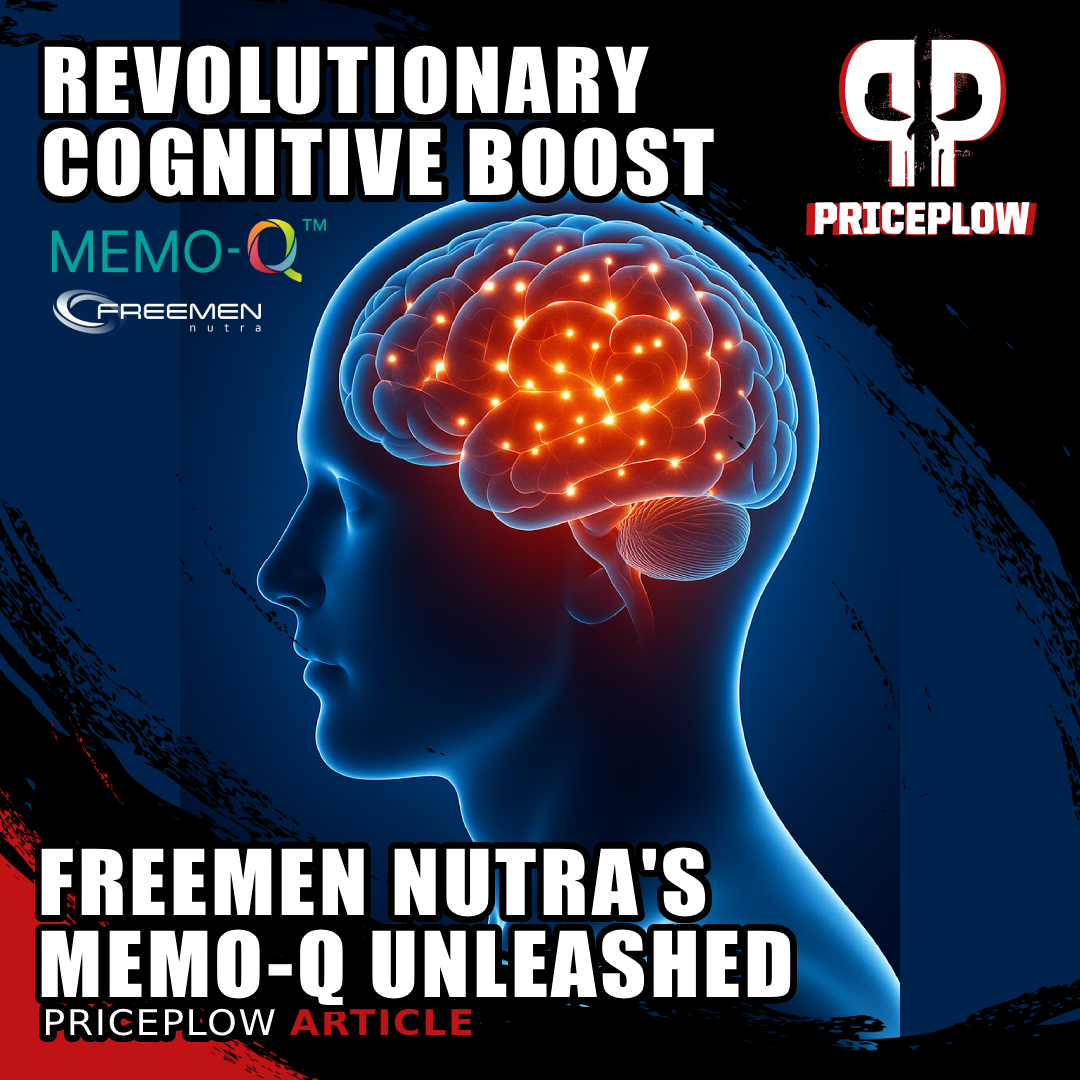
Memo-Q breaks the mold in cognitive enhancement. This silk protein-derived ingredient from Freemen Nutra has 10 human clinical trials showing memory and learning benefits across ALL ages -- from 7-year-olds to 90+ seniors. Four mechanisms, one powerful ingredient. 400-600mg daily.
Memo-Q: Cognitive Breakthrough Nootropic Peptide From Silk Protein
This isn't another nootropic with a handful of studies on college students. Memo-Q stands alone with 20 years of research and 10 human clinical trials spanning every age group from children to seniors in their 90s. The ingredient delivers measurable improvements in memory, learning, focus, and overall cognitive function, all from enzymatically hydrolyzed fibroin, the structural protein at the heart of silkworm cocoons.
What makes Memo-Q exceptional isn't just its novel source material. While most cognitive ingredients target narrow mechanisms or specific populations, Memo-Q works through four distinct pathways:
- Boosting acetylcholine
- Stimulating BDNF production
- Providing neuroprotection, and
- Enhancing cerebral blood flow
The result? A cognitive ingredient that delivers universal benefits whether you're a student cramming for exams, a professional juggling complex projects, or an older adult maintaining mental sharpness.
A Different Kind of Nootropic Ingredient (Formerly Cera-Q)
While acetylcholine is mentioned above, Memo-Q isn't a choline donor like many other cognitive enhancers. Instead, it protects and supports acetylcholine, making it ideal to stack with choline sources like citicoline or alpha-GPC. It's also water-soluble, stable, and neutral-tasting, opening opportunities in capsules, powders, gummies, beverages, and even functional chocolates.
Numerous Studies Covered Inside
The clinical evidence reads like a cognitive enhancement wishlist: dose-dependent improvements in Memory Quotient scores, 62% reduction in learning gradient (fewer repetitions needed to learn), enhanced working memory and executive function, and significant improvements in attention and processing speed.

This silk protein-derived nootropic claims the top spot for memory research, targeting four key areas of brain function you want to optimize.
These aren't marginal gains -- they're the kind of results that made Korean regulatory authorities take notice and approve Memo-Q for cognitive health claims. Beyond that, there's even research for metabolic and cardiovascular health! This ingredient embraces the power of peptides, with research supporting its use well before the word "peptide" became a trend.
As we dive into the science behind this silk-derived breakthrough, you'll discover why Memo-Q (formerly known as Cera-Q) may be the most comprehensive cognitive ingredient you've never heard of. Sign up for PricePlow's Freemen Nutra and Memo-Q alerts, and then let's dive into the world of silk protein.
Subscribe to PricePlow's Newsletter and Alerts on These Topics
The Cognitive Enhancement Challenge
The nootropics market faces a fundamental problem: most cognitive ingredients don't work for everyone. Recent systematic reviews paint a sobering picture: popular supplements from omega-3s to ginkgo biloba show mixed results ranging from null to moderate effects on memory and cognition.[1] Meanwhile, pharmaceutical interventions designed to prevent cognitive decline not only fail to improve mental function in normal individuals but also increase the incidence of serious side effects.[2]
Even ingredients that show promise usually target narrow demographics or single mechanisms. Research often focuses on college students cramming for exams or elderly adults fighting decline, leaving out children, working professionals, and healthy seniors who want to stay sharp. Each stage of life has unique demands: children need support for developing attention and memory, adults require focus and mental flexibility, and older individuals must preserve processing speed and cognitive reserves. Yet most supplements offer one-size-fits-all solutions that miss these nuances.
Mechanistically, the gaps are just as clear. Memory formation requires acetylcholine, neuroplasticity depends on BDNF, protection against oxidative stress calls for antioxidant activity, and optimal brain function needs adequate blood flow. Most ingredients influence one, maybe two of these systems. But the brain doesn't operate in isolation... it requires coordinated support across multiple pathways.
Silk Protein: A Surprising Yet Will-Researched Solution
Enter an unlikely source: silk protein. While researchers explored traditional uses of silk in Asian medicine, they discovered that enzymatically hydrolyzed fibroin (the protein that gives silk its strength) produces bioactive peptides with extraordinary cognitive properties.
Unlike synthetic compounds designed in labs or plant extracts with limited bioavailability, these silk-derived peptides act on multiple pathways simultaneously, delivering benefits that span from childhood through advanced age. They're also water-soluble, beverage stable, and neutral-tasting, enabling numerous applications.
This discovery would lead to Memo-Q, an ingredient that breaks the mold of conventional nootropics by addressing the full spectrum of cognitive enhancement needs in a single, naturally derived compound. Let's discuss how it all started:
Memo-Q’s Development: From Silk to Science
From Tradition to Discovery
The path to Memo-Q began with an ancient observation: silk had been used in traditional Asian medicine for centuries, valued not only for textiles but also for its health benefits.[3] Scientists identified fibroin, the structural protein forming the inner core of silk strands, as something extraordinary. Its repeating glycine and alanine residues create beta-sheets that give silk its legendary strength, and researchers wondered whether these same structures held untapped biological activity.
Unlocking Bioactive Peptides
The challenge was that fibroin is tough and insoluble. Researchers hypothesized that breaking it into smaller, absorbable fragments could unlock hidden cognitive benefits. The breakthrough came with enzymatic hydrolysis, using specific proteases to cleave fibroin into peptides in the critical 500-5000 dalton range.[4] This size allowed the peptides to retain bioactivity while crossing the gut and blood-brain barrier effectively. The resulting product is dominated by glycine (42.5%), alanine (28.2%), and serine (9.4%), the same amino acids that confer silk's strength, now reconfigured to support cognitive function.[4]
A Research Program Across All Ages
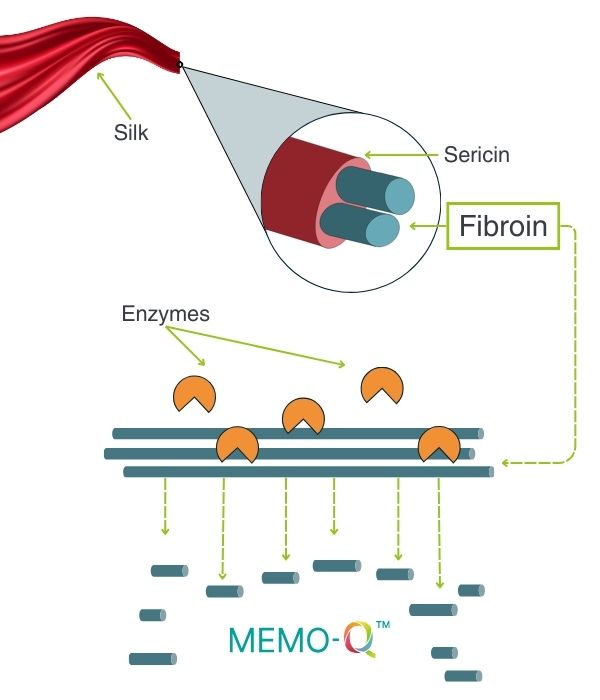
This diagram shows how silk fibroin gets enzymatically broken down into the bioactive peptides that power your cognitive enhancement.
Beyond its unique source, Memo-Q is built upon a world-class research strategy. Instead of focusing on one demographic, researchers systematically studied it across the human lifespan: children as young as 7, high school and college students, working adults, and seniors into their 90s.[3] This unprecedented program shows consistent benefits beyond memory, including better learning efficiency in children, enhanced executive function in adults, faster processing speed in students, and preserved flexibility in the elderly. Over two decades, this work produced 10 human clinical trials and 8 mechanistic studies -- most of which are discussed below.
Initially studied and marketed as "Cera-Q" in some regions, the ingredient is now branded as Memo-Q by Freemen Nutra. Its clinical record and exceptional safety led the Korean Ministry of Food and Drug Safety to approve it as a food ingredient with no limits on intake -- a testament to both its efficacy and safety profile.[3]
With that background, it's time to get into the bulk of this article: Memo-Q's numerous human clinical trials:
Memo-Q’s Clinical Trials
Memo-Q has been successfully studied across numerous demographics with several incredible endpoints:
-
Dose-Response Memory Study: Kang 2018 in Healthy Adults
The most comprehensive evaluation of Memo-Q's cognitive benefits came from a landmark dose-response study that established optimal dosing and confirmed its extraordinary effects on memory.[3] This double-blind, placebo-controlled trial enrolled 76 healthy adults averaging 55 years of age, divided into four groups receiving 0, 280, 400, or 600mg daily for three weeks.
The study used the Rey-Kim Memory Test to assess both verbal and non-verbal memory performance. Results showed dose-dependent improvements across virtually every cognitive measure. Memory Quotient (MQ) scores (a large index of memory function) increased dramatically: 9.6% at 280mg, 20.4% at 400mg, and 24.8% at 600mg (p < 0.0001 for all doses). The low p-value and large effect size (ω² = 0.605) indicate clinically meaningful improvements.
Working professionals see measurable improvements in memory retention and cognitive processing that translate to real-world performance gains.
The learning gradient analysis revealed how quickly participants could memorize new information through repetition. The 400mg dose was optimal for improving initial learning, with participants remembering significantly more words on their first trial. By the fifth repetition, the 600mg group showed the highest retention, demonstrating Memo-Q's dual action on both learning speed and memory consolidation.
Memory retention (defined as the ability to maintain stored information) improved by more than 300% in the 400mg and 600mg groups compared to placebo, with an absurdly small p < 0.0001, indicating incredible statistical significance. The Rey Complex Figure Test showed similar enhancements in visuospatial memory and executive function, with participants better able to copy and recall complex geometric patterns after supplementation.
No adverse effects were reported at any dose level, confirming Memo-Q's exceptional safety profile even at the highest 600mg dose.
-
Children’s Cognitive Benefits
While most nootropics lack pediatric research, Memo-Q stands out with multiple studies in healthy children, a population where cognitive enhancement research is notoriously difficult to conduct.
Even young kids show better attention and memory recall, making this one of the few nootropics with pediatric research backing.
-
Kim K 2009: Attention and Cognitive Flexibility in Children 9-11 Years Old
Kim et al. (2009) investigated Memo-Q's effects on attention and cognitive flexibility in 46 normal children aged 9-11 years.[5] Using the Color Trails Test (CTT), researchers found that 400mg daily for 16 weeks reduced response time by 23% while cutting errors in half. The CTT requires children to connect colors and numbers in sequence -- a task demanding sustained attention, processing speed, and cognitive flexibility. The twofold improvement in accuracy demonstrated Memo-Q's ability to enhance both speed and precision of cognitive processing.
-
Kim DH 2009: Mathematical Ability and Academic Performance
Both 400mg and 600mg doses deliver statistically significant improvements in how well you retain learned information.[3]
A separate study by Kim et al. (2009) examined Memo-Q's impact on academic performance, documenting improvements in mathematical ability, working memory, and attention span in school-aged children receiving milk fortified with 400mg daily.[6] The researchers noted these improvements translated to better classroom performance and homework completion.
-
Kim DH 2010: Memory Preservation in Young Children 7-12 Years Old
Kim et al. (2010) focused specifically on memory preservation in younger children aged 7-12.[7] After supplementation with 400mg daily, children showed 24% better memory preservation, maintaining learned information significantly longer than controls. Both short-term and long-term memory improved, with benefits appearing within four weeks and continuing to increase through the 16-week study period.
-
-
Adult and Elderly Cognitive Support
The breadth of Memo-Q research extends across the adult lifespan, with studies demonstrating benefits for working adults, college students, and elderly individuals facing cognitive decline.
Students need fewer repetitions to learn material and make fewer math errors when supplementing with this silk protein extract.
-
Chae 2004: Learning Efficiency in High School Students
Chae et al. (2004) evaluated 40 high school students preparing for college entrance exams, finding that 400mg daily for three weeks reduced the learning gradient by 62%, meaning students needed 62% fewer repetitions to memorize new material.[8] This dramatic improvement in learning efficiency came alongside enhanced memory preservation and faster recall speed.
-
Lee SH 2004: Brain Imaging and Blood Flow in College Students
Lee et al. (2004) used advanced brain imaging to understand Memo-Q's mechanisms in college students.[9] The study revealed increased blood flow to the parahippocampal gyrus and medial temporal areas, which are brain regions critical for memory formation and retrieval. Participants showed 27% improvement on auditory verbal learning tests alongside these measurable changes in brain activity.
-
Lee SH 2004: Working Memory and Spatial Memory in Adults 27-59 Years Old
You'll see impressive double-digit improvements across memory, learning, and focus tests when you supplement with this silk-based ingredient.
In this trial of healthy adults aged 27–59, Memo-Q improved working memory, number memorization, and spatial memory.[10] The Wechsler Adult Intelligence Scale showed 17% score increases, while the Paced Auditory Serial Addition Test (measuring attention and processing speed) improved by 22%.
-
Kim DK 2004: Cognitive Function in Elderly Adults 70-82 Years Old
Perhaps most impressively, Kim et al. (2004) studied Memo-Q in elderly adults aged 70-82 experiencing mild cognitive decline.[11] The Mini-Mental State Examination (MMSE), the standard assessment for cognitive decline, improved significantly with 400mg daily supplementation. Participants showed better overall cognitive function, including improvements in memory, attention, language skills, and visuospatial abilities.
-
-
Statistical Significance and Real-World Impact
What distinguishes Memo-Q from other cognitive ingredients isn't just the number of studies but their consistent statistical rigor. Effect sizes ranged from medium to large across trials, with p-values frequently below 0.001, indicating less than 0.1% probability these results occurred by chance. The dose-dependent responses observed in multiple studies further validate the genuine biological activity of the ingredient.
Put simply, we rarely see this level of statistical significance in legally-compliant dietary supplements, nor do we see it happen so consistently.
Whether you're a student cramming for exams or an adult maintaining mental sharpness, this ingredient delivers targeted benefits for your life stage.
More importantly, the improvements translate to real-world benefits: students learning material faster, children performing better in school, adults maintaining focus through demanding workdays, and seniors preserving their cognitive independence. With optimal dosing established at 400-600mg daily and benefits appearing within three weeks, Memo-Q offers both immediate and longer-term cognitive enhancement backed by extraordinary clinical evidence.
Beyond Cognition: Systemic and Practical Benefits
Memo-Q's strongest data lies in cognition, but the research goes deeper. Preclinical work shows that fibroin hydrolysates don't just act in the brain -- they also influence glucose metabolism and vascular tone, and healthy inflammatory processes, creating a foundation for broader "healthy aging" applications.
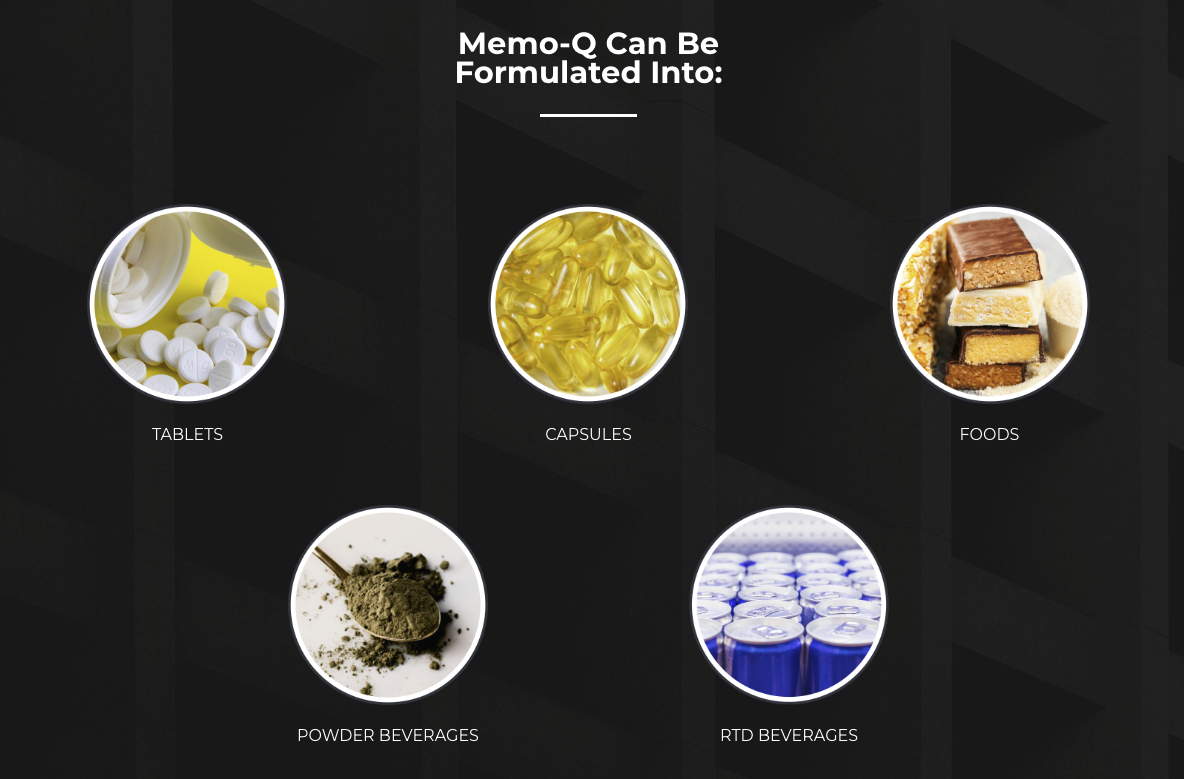
You'll find this ingredient in everything from traditional capsules to functional foods and ready-to-drink beverages.
-
Metabolic Support: Glucose and Insulin Sensitivity
Animal and cell studies demonstrate that fibroin-derived peptides enhance insulin signaling and glucose uptake. Mechanistically, they upregulate GLUT4 translocation and activate PI3K/Akt pathways, improving carbohydrate disposal in both normal and insulin-resistant states.[12,13] This metabolic effect positions Memo-Q as more than a nootropic: it's potentially useful in formulations aimed at energy, body composition, and long-term metabolic health.
-
Cardiovascular Health: Blood Pressure and Vascular Function
Several silk-derived peptides act as natural ACE inhibitors. In hypertensive rat models, fibroin hydrolysate lowered systolic blood pressure and improved vascular relaxation, with a couple of key dipeptides driving the effect.[14,15] While not the marketing headline, these findings reinforce Memo-Q's role in maintaining circulation, and complement its human data on cerebral blood flow.
-
Anti-Inflammatory and Antioxidant Protection
Memo-Q reduces neuroinflammation in preclinical models, decreasing hippocampal TNF-α, IL-1β, and IL-6 while boosting brain-derived neurotrophic factor (BDNF).[4,16] It also mitigates oxidative stress and protects neurons against amyloid and ischemic insults.[8] Together, these mechanisms support its neuroprotective positioning and suggest broader resilience benefits.
Mechanisms of Action: How Does Memo-Q Work So Well?
Understanding the mechanisms helps us understand how to formulate with Memo-Q:
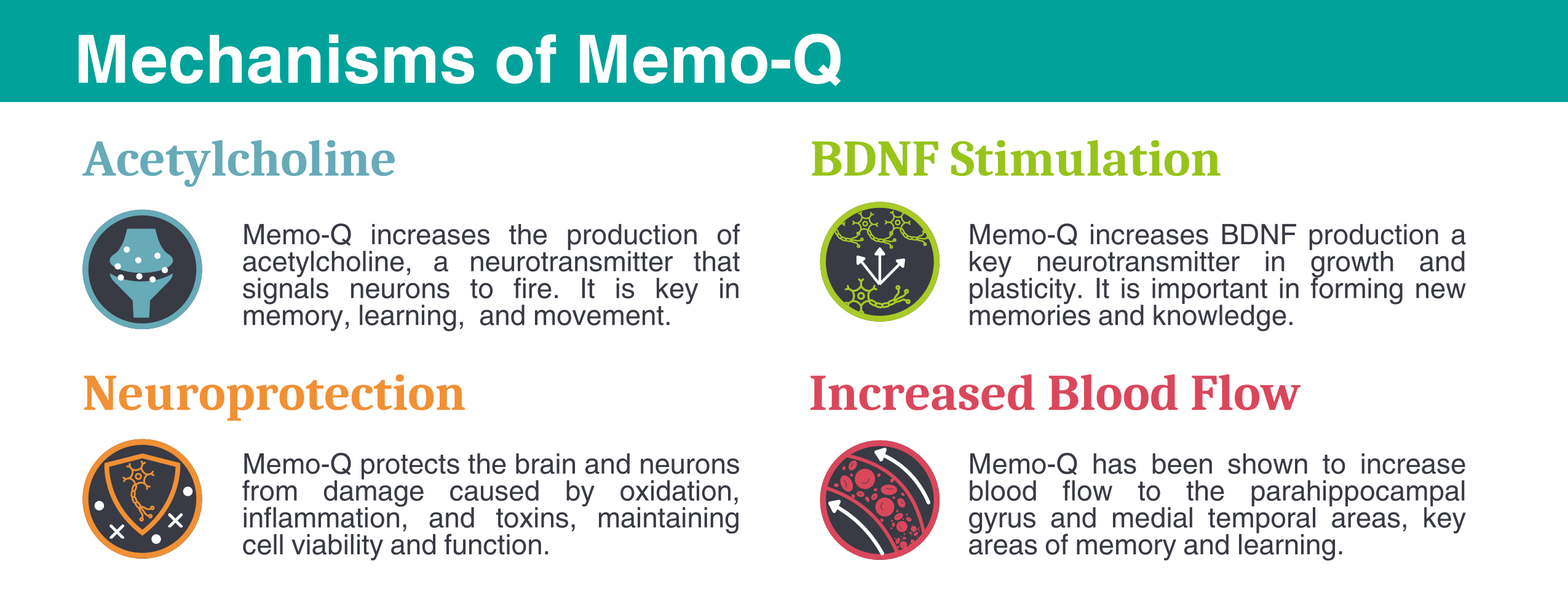
Unlike single-pathway nootropics, you're getting comprehensive brain support through four distinct biological mechanisms.
-
Acetylcholine Enhancement: The Memory Neurotransmitter
Acetylcholine is the brain's primary neurotransmitter for memory formation and learning. Memo-Q enhances this critical system through multiple pathways that work even without additional choline supplementation.[4] The ingredient protects existing acetylcholine from degradation while suppressing acetylcholinesterase (AChE), the enzyme responsible for breaking the neurotransmitter down.[16]
This dual mechanism proves especially powerful. When researchers challenged brain cells with scopolamine (a compound that blocks acetylcholine receptors and induces temporary amnesia), Memo-Q maintained cellular viability and prevented memory impairment.[8] Animals pretreated with Memo-Q showed significantly better performance on passive avoidance tests and water maze navigation despite scopolamine exposure, demonstrating the ingredient's ability to preserve cholinergic function under stress.
You'll see clear dose-dependent improvements in memory function, with the highest 600mg dose delivering nearly 25-point gains over placebo.[3]
The implications for formulation are compelling. Since Memo-Q enhances acetylcholine without supplying choline itself, combining it with choline sources like citicoline or alpha-GPC could create synergistic effects through complementary pathways: one preserving existing acetylcholine, the other providing raw materials for new synthesis.
-
BDNF Stimulation: Neuroplasticity and Growth
Brain-Derived Neurotrophic Factor (BDNF) orchestrates the brain's ability to adapt, learn, and form new memories. Memo-Q significantly increases BDNF production, triggering a cascade of neuroplastic benefits that explain many of its cognitive enhancements.[16]
BDNF activates the PI3K/AKT/mTOR pathway, a key cascade for neuronal survival and growth. This pathway activates CREB, a protein that helps convert short-term memories into long-term ones. This helps explain Memo-Q's impact on both recall and long-term memory.
Research shows that amyloid beta (the protein that forms toxic plaques associated with neurodegeneration) suppresses BDNF expression. Memo-Q counteracts that suppression, maintaining healthy BDNF levels even in the presence of neurotoxic challenges.[16] This protective effect on BDNF signaling contributes to the ingredient's ability to support cognitive function across all age groups, from developing children to elderly adults facing cognitive decline.
Two decades of research backing this ingredient sets it apart from typical nootropics that rely on just a few studies.
The neuroplasticity benefits extend beyond memory. BDNF promotes the generation of new neurons and synapses while protecting existing ones from death. With both neurogenesis and neuroprotection from improved BDNF, Memo-Q can create an environment where the brain can maintain cognitive flexibility, adapt to new challenges, and preserve function despite aging or stress.
-
Comprehensive Neuroprotection
Memo-Q's neuroprotective capabilities extend far beyond typical antioxidant effects. The ingredient has demonstrated protection against an impressive array of neurotoxic challenges in preclinical studies, including scopolamine, amyloid beta, iron sulfate (FeSO₄), 3-hydroxykynurenine, and even surgically induced ischemia.[8]
Higher doses help you learn material more efficiently, though the improvements level off as you increase from 400mg to 600mg daily.[3]
When neuroblastoma cells were exposed to amyloid beta peptides (which typically trigger oxidative stress, inflammation, and apoptosis), pretreatment with Memo-Q maintained cellular viability and prevented the characteristic markers of neuronal death. The ingredient reduced expression of pro-inflammatory cytokines like TNF-α and interleukin-1β while suppressing apoptotic signaling pathways including JNK and NF-κB cascades.
This multi-target neuroprotection appears to work through several mechanisms simultaneously. Memo-Q maintains mitochondrial function under oxidative stress, preserves cellular energy production, and prevents the accumulation of reactive oxygen species that damage neuronal membranes and DNA. The ingredient also modulates inflammatory responses in microglial cells (the brain's immune cells), preventing the chronic neuroinflammation that contributes to cognitive decline.
The broad-spectrum protection suggests Memo-Q doesn't just target one pathway but rather supports the brain's overall resilience. This comprehensive approach helps explain why the ingredient shows benefits across diverse populations, from healthy children to adults with mild cognitive impairment.
-
Enhanced Cerebral Blood Flow
Imaging studies reveal another crucial mechanism: Memo-Q increases blood flow to brain regions critical for memory formation and retrieval. Specifically, research documented enhanced perfusion in the parahippocampal gyrus and medial temporal areas, which are brain regions that house the hippocampus and surrounding structures essential for converting experiences into memories.[9]
You'll remember significantly more words on both initial learning and after repetition, with 400mg showing optimal first-trial performance.[3]
The increased blood flow correlated directly with cognitive improvements. Participants showing the greatest increases in cerebral perfusion also demonstrated the most significant gains on auditory verbal learning tests, with 27% improvement in word recall. Enhanced blood flow delivers more oxygen and glucose to active neurons while efficiently removing metabolic waste products that can impair function.
Cardiovascular Blood Flow and Glucose Metabolism
Beyond simple blood flow increases, research indicates that silk fibroin peptides possess antihypertensive properties[15][14] and can stimulate glucose uptake through GLUT1 and GLUT4 transporters.[13][12] This enhanced glucose metabolism provides neurons with the energy needed for demanding cognitive tasks while potentially offering protective benefits against metabolic dysfunction that contributes to cognitive decline.
The vascular benefits complement the other mechanisms perfectly. Better blood flow enhances the delivery of BDNF and other neurotrophic factors throughout the brain, supports the cholinergic system's high metabolic demands, and helps clear neurotoxic proteins before they can accumulate and cause damage.
-
Synergistic Mechanisms Create Greater Benefits
What makes Memo-Q exceptional isn't just the individual mechanisms, but how they work together. Enhanced acetylcholine improves immediate memory formation and recall. Increased BDNF consolidates these memories for long-term storage while promoting neuroplasticity. Neuroprotection brings the maintenance of cellular health despite challenges. Improved blood flow ensures all systems have the resources they need to function optimally.
This multi-mechanism approach explains why Memo-Q shows consistent benefits across such diverse populations and cognitive measures. It supports several fundamental processes underlying multiple facets of cognitive function.
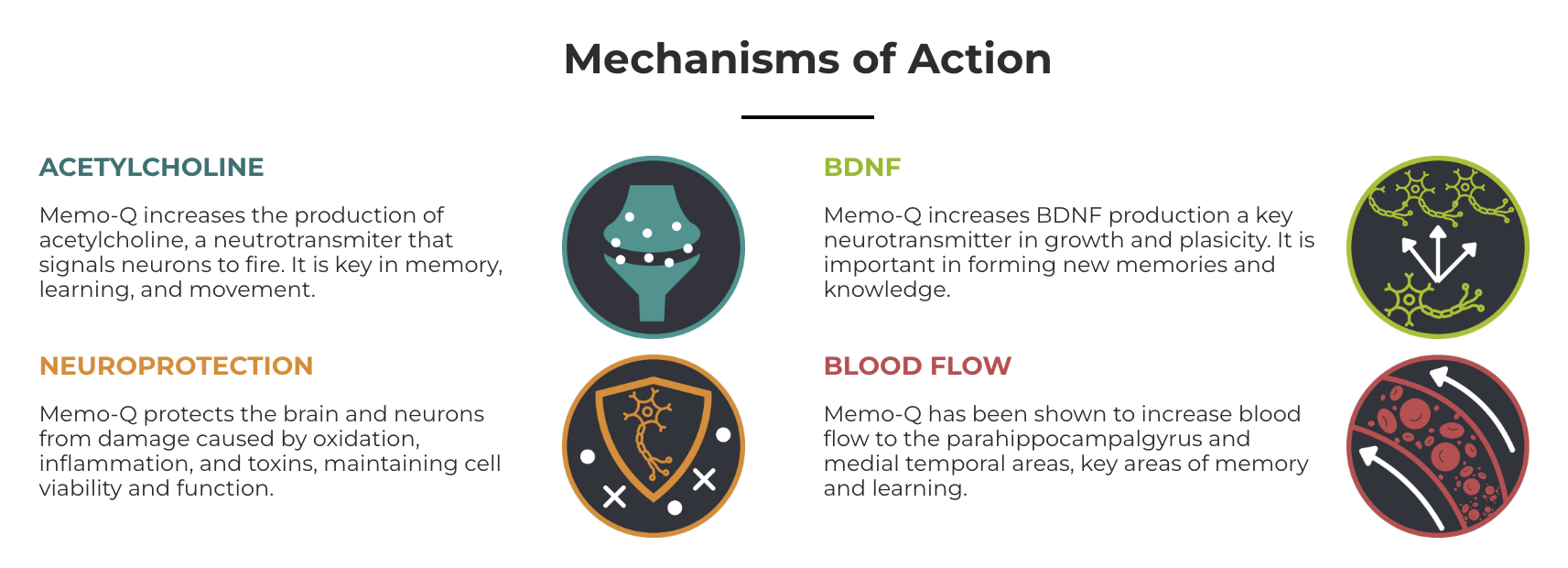
You're getting brain support through acetylcholine enhancement, BDNF stimulation, neuroprotection, and improved blood flow -- all from one ingredient.
Safety and Formulation Considerations
Memo-Q demonstrates an exceptional safety profile across two decades of clinical research. In the landmark dose-response study by Kang et al. (2018), no adverse effects were reported by any of the 76 participants across all treatment groups, including those receiving the highest 600mg daily dose.[3] This finding remains consistent throughout all ten human clinical trials spanning from children as young as 7 to elderly adults in their 90s.
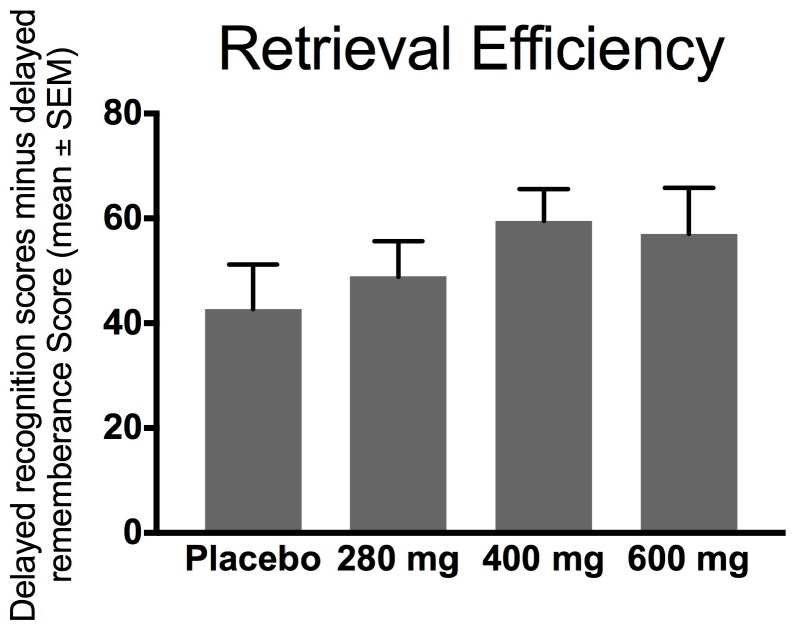
our ability to recall information after delays improves with supplementation, though the effect plateaus around 400mg daily.[3]
The Korean Ministry of Food and Drug Safety has approved Memo-Q as a food ingredient with no limits on the intake amount, a regulatory endorsement that underscores both its safety and efficacy.[3] This approval followed rigorous evaluation of the extensive clinical evidence, including studies lasting up to 16 weeks with daily doses ranging from 200 to 600mg.
Unlike some cognitive enhancers that often cause gastrointestinal distress, cardiovascular effects, or sleep disturbances, Memo-Q has shown no difference in adverse effects compared to placebo across all age groups. The ingredient's natural origin from enzymatically hydrolyzed silk protein contributes to its gentle profile, passing through the blood-brain barrier without triggering the side effects commonly associated with synthetic nootropics.
Practical Usage: Dosing, Safety, and Formats
While Memo-Q's safety record is exemplary, standard supplement precautions apply. Individuals with silk allergies should avoid the product, though such allergies are rare. Those taking medications for neurological conditions, blood clotting disorders, or other serious health conditions should consult their healthcare provider before starting any new supplement regimen. Pregnant and lactating women should also seek medical advice, as these populations were excluded from clinical trials.
For optimal results, take Memo-Q consistently at the studied doses of 400-600mg daily, divided into two doses. Benefits typically appear within three weeks, with continued improvements through 16 weeks of supplementation based on available research.
Formulation Opportunities
Memo-Q is water-soluble, shelf-stable for three years, and neutral-tasting, making it versatile across capsules, powders, gummies, beverages, and even functional chocolates.

Formulators love this ingredient's versatility -- it's water-soluble, neutral-tasting, and stable across multiple delivery formats.
Memo-Q is not a choline donor, but it complements choline sources like citicoline, alpha-GPC, or even simple choline bitartrate. This makes it attractive in stacked nootropics where acetylcholine support is a theme. Beyond classic cognition SKUs, potential target categories include:
- Student and exam support (validated by academic-style testing in clinicals)
- Menopause brain fog (combining Memo-Q with iron, choline, and hormone-supporting ingredients)
- General healthy aging blends, leveraging its vascular and metabolic benefits
In the sports nutrition market, we see a massive opportunity to use Memo-Q to enhance the "mind-muscle connection" we get from acetylcholine boosters such as Cognizin® citicoline or alpha-GPC, rather than relying on poorly-studied ingredients with questionable regulatory statuses such as huperzine A.
Conclusion: Memo-Q Sets the New Standard for Cognitive Enhancement
After two decades of research and ten clinical trials, Memo-Q stands alone in the cognitive enhancement landscape. No other ingredient can claim proven benefits across the entire human lifespan -- from 7-year-old students to 90-year-old seniors -- with the statistical rigor and safety profile demonstrated here. Freemen Nutra has a phenomenal ingredient on their hands here.
The numbers tell an incredible story:
- 24.8% improvement in Memory Quotient scores
- 62% reduction in learning repetitions needed, 50% fewer errors in attention tasks
- 27% better word recall correlating with enhanced cerebral blood flow
These aren't incremental improvements that barely achieved statistical significance, either: they're transformative changes backed by p-values often below 0.001 and large effect sizes large.
Memo-Q separates itself from the nootropic pack with a large series of mechanisms of action, well beyond just a single one:
- Enhancing acetylcholine
- Stimulating BDNF
- Providing broad-spectrum neuroprotection
- Improving cerebral blood flow (and potentially systemic blood flow)
This multi-pathway approach explains why the ingredient delivers consistent benefits whether you're supporting a child's developing brain, maintaining peak performance as an adult, or preserving cognitive function in later years.
The Korean regulatory approval with no intake limits (although we'll stick to 400-600mg), combined with zero reported adverse effects across all studies, positions Memo-Q as one of the safest cognitive ingredients on the market, and with the broadest application. As the supplement industry moves toward evidence-based formulations, Memo-Q goes beyond the gold standard: an ingredient that delivers on its promises with extraordinary scientific backing.
For formulators seeking the next breakthrough in cognitive health, the search ends with this silk-derived innovation. Memo-Q isn't just another nootropic... it's the universal cognitive enhancer the industry has been waiting for.

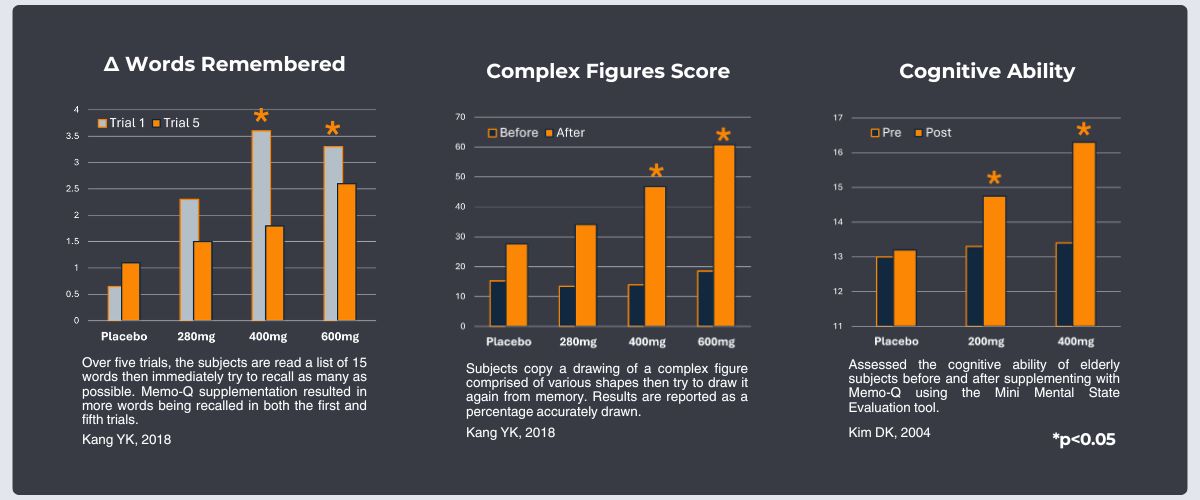
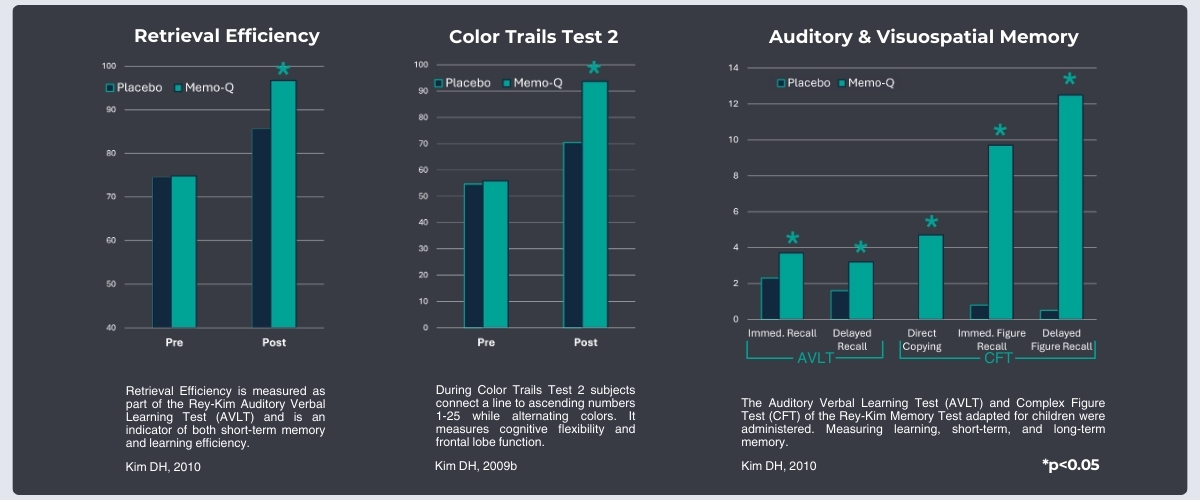
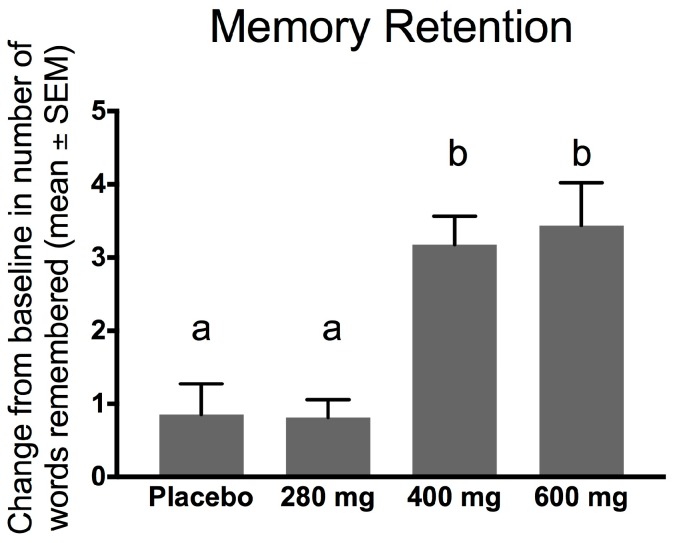
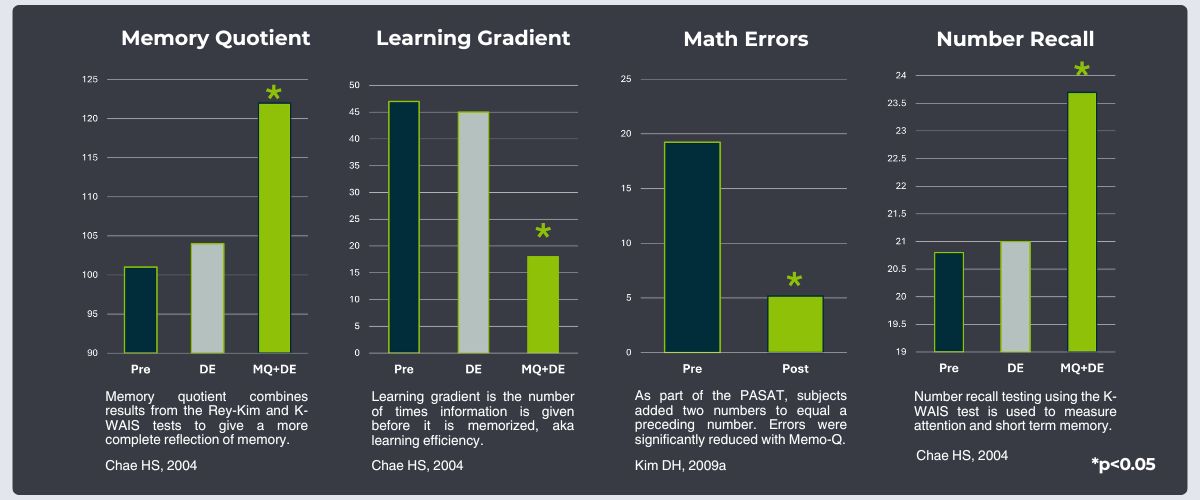


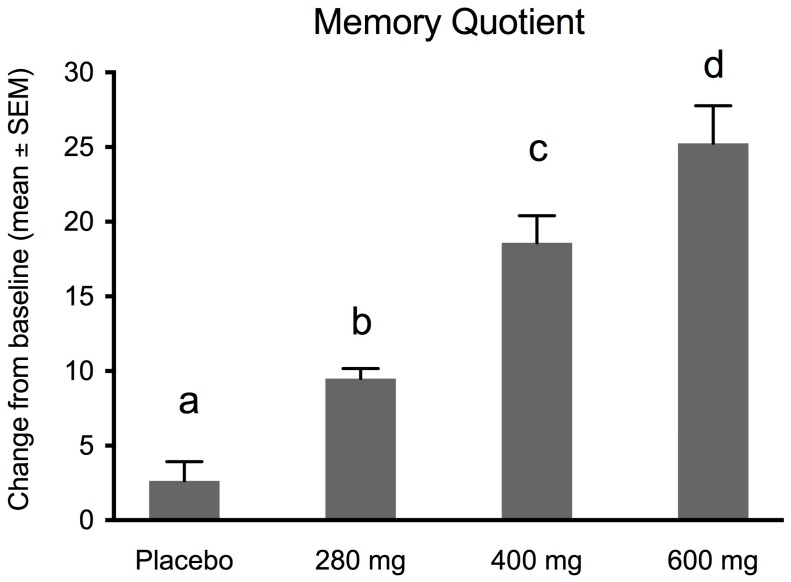

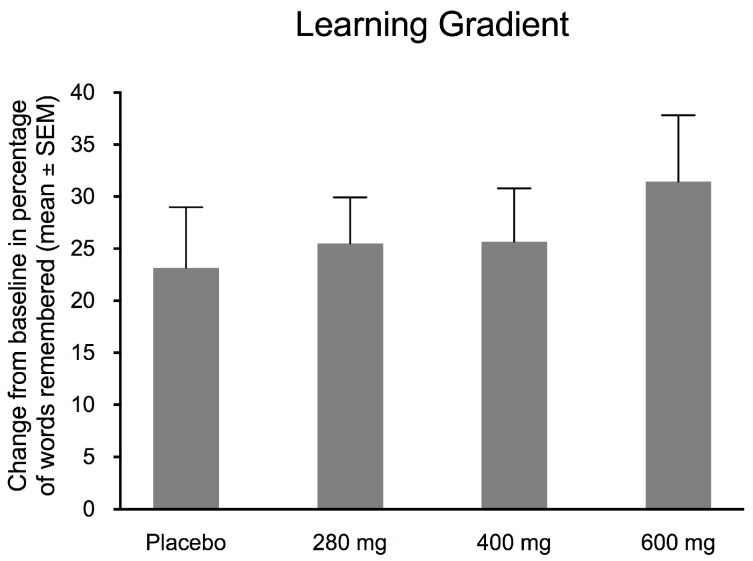
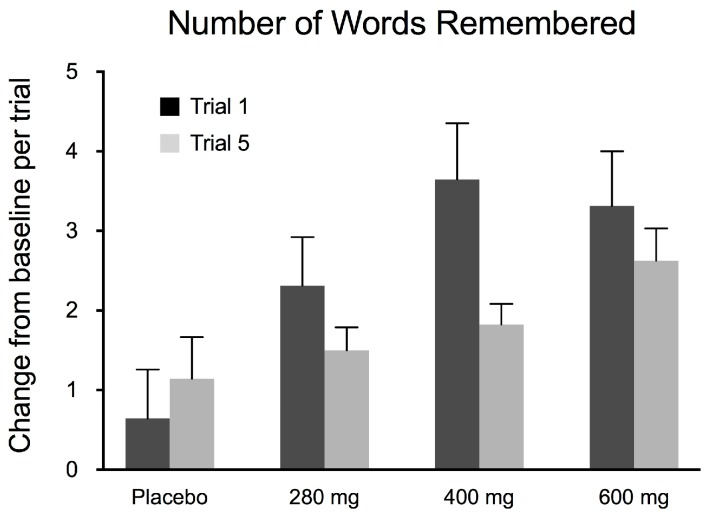
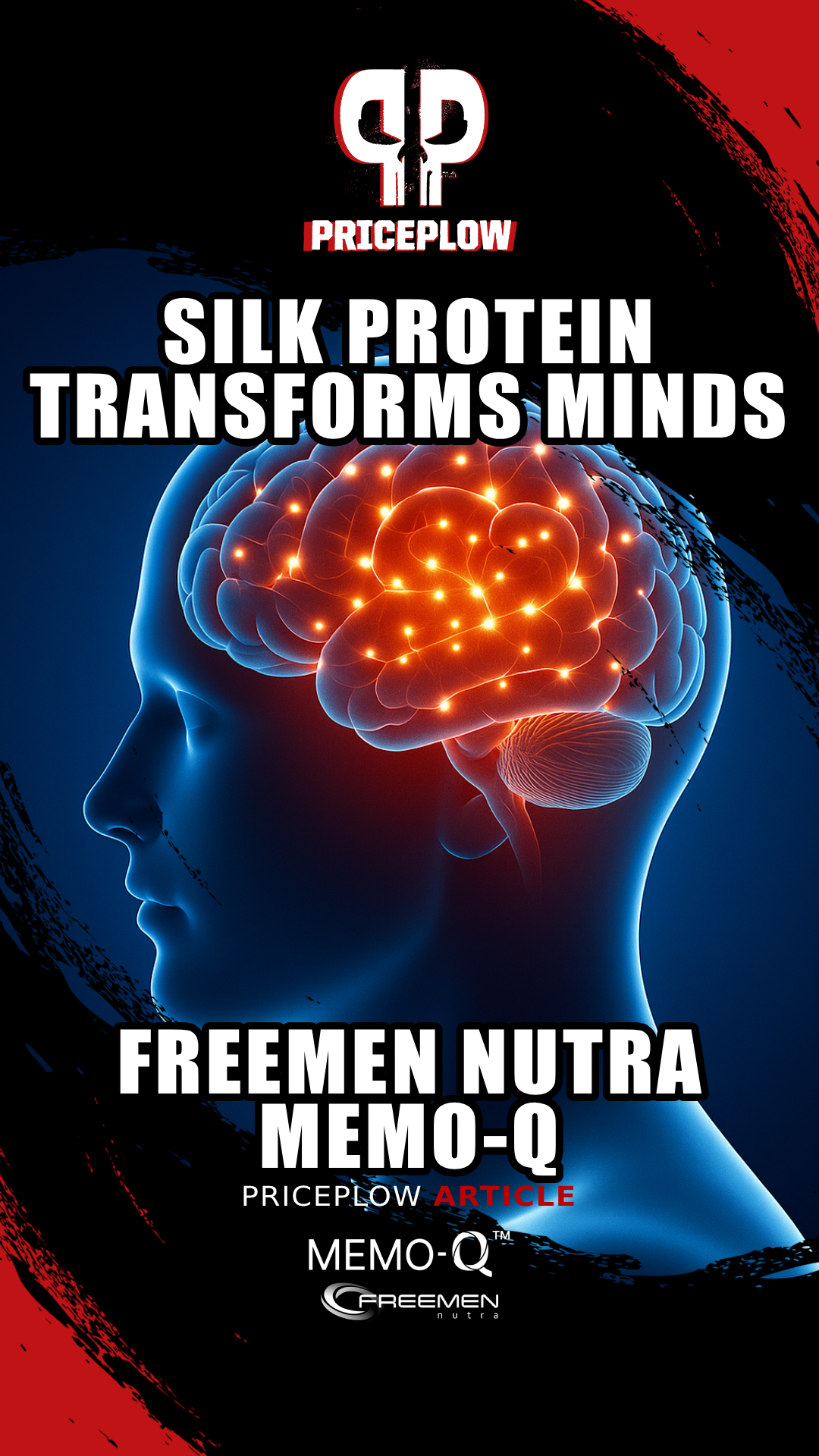


Comments and Discussion (Powered by the PricePlow Forum)